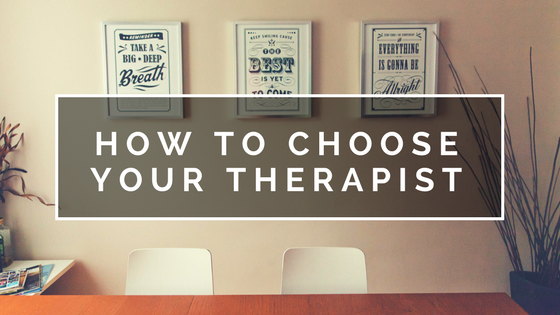You’ve finally hit the breaking point. Whether your sadness and depression are the lowest they’ve ever been, your anxiety has hit a fever pitch, or your marriage feels like it’s crumbling around you, you’ve likely hit rock bottom and are looking for a way out. The idea of therapy may have popped into your head from time to time, but today you’re at the point where you’re ready to start.
But how do you make a decision about which therapist is the best fit for you?
The process of looking for a therapist is anxiety-inducing by nature. Therapy is stigmatized in the media, and you may only know horror stories of therapists you heard from friends or family. The hurdle of making the first appointment can feel insurmountable. Common wisdom says that people wait three to six months after receiving a referral to a therapist before scheduling their first appointment.
Here are a few pointers in your search for a therapist.
Ask for a recommendation.
People you know who have seen therapists are often your best resource for a good counselor. If your friend has seen a therapist and had a positive experience, this is one of your best indicators that this therapist might click with you. Ask your family or friends for names of counselors they’ve seen. Check out the counselor’s website and online presence to get a sense of their voice. If they have a blog, read some articles to see who they are and if you feel as though you can feel comfortable with this individual.
Look for a therapist who specializes in the issue you’re dealing with.
Often, therapists have a specialty in an area of interest for which they have a unique passion. For example, my area of specialty is sex and love addiction, particularly as it relates to women. Therapists attend events or get additional training in these issues in order to be the best resource for you. Look at the therapist’s “about” page on their website to learn more about these specialties.
Attend the first session to see if you feel comfortable with the therapist and can grow to trust them.
The first session is a good opportunity to test out your fit with your therapist. You want to feel connected early on in therapy. While trust is generally built over time, you can typically get a good sense for the potential to trust in that first session. If you notice yourself feeling “off” in relationship with your therapist, if you are just staying in therapy to appease them, and especially if you feel as though you are being manipulated by your therapist, then you may want to find someone who is a better fit.
Identify if the counselor has a fundamental curiosity about you and your story.
Therapy is meant to be an exploration of your personal narrative with your counselor acting as a guide to help illuminate additional viewpoints and insights into your life story. In order for this to happen, your therapist needs to be curious about your story: asking questions, digging deeper, exploring different perspectives on the content you bring to session.
Your therapist should be willing to push your buttons…but not too much.
Your counselor should strive to strike the delicate balance between pushing back against some of the faulty beliefs and behavior patterns in your life in order to encourage you to change, but not doing so until you feel uncomfortable. You will likely feel slight discomfort as your therapist presses into your issues. But if you’re feeling too uncomfortable in relationship with your therapist, that may be a sign that they’re not the right fit for you.
Counselors need to make space for their own therapy, practice quality self-care, and set appropriate boundaries.
Many graduate programs require their therapists to be involved in their own personal therapy. Therapists spend their days hearing the pain and difficulty in others’ stories, and they need a space to receive their own care from a therapist. You want your therapist to practice what they preach. They likely won’t be perfect at it, but you want your therapist to set appropriate boundaries and take good care of themselves so that they can be fully present with you and your story.
See if your therapist’s values reflect your own.
As much as therapists try to be neutral, therapists do bring their personalities and their values into their sessions. If you have a significant role in your identity that feels important to you, look for a therapist who fits with that identity. For example, if you are a Christian, finding a therapist who is also Christian helps you to connect over those spiritual values.





